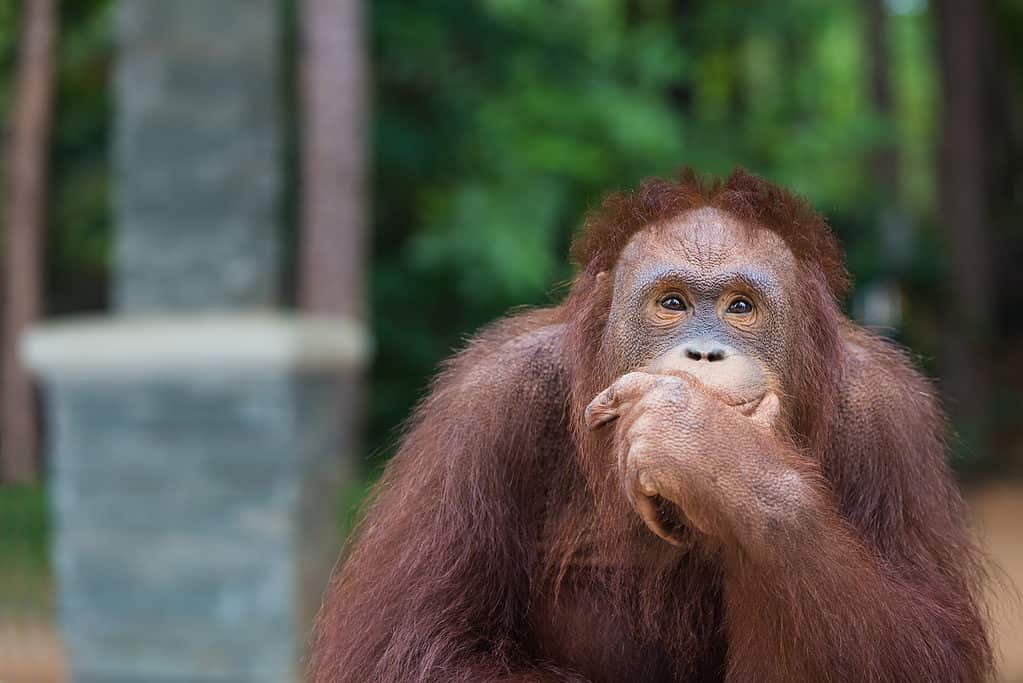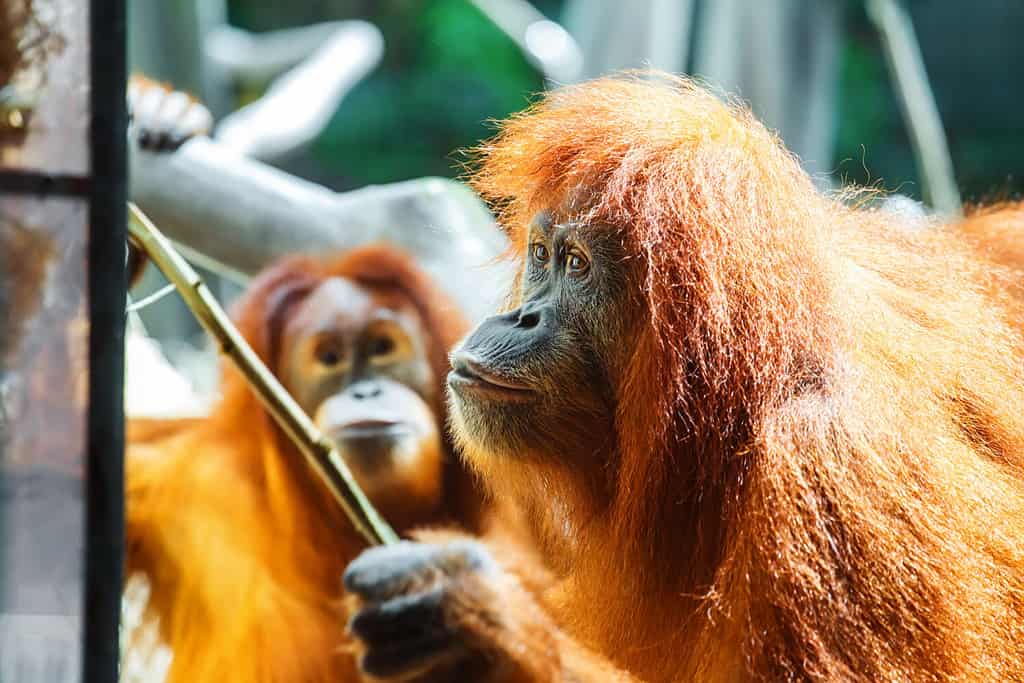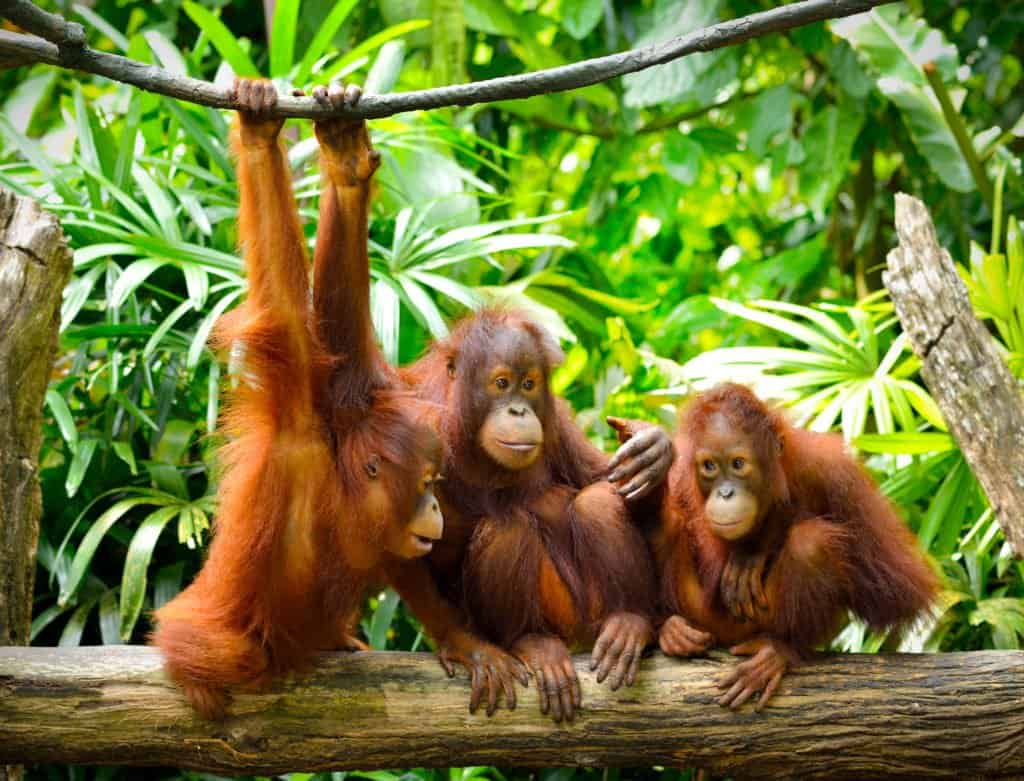Orangutans are among the most intelligent animals in the world. We know that orangutans are exceptionally smart, based on multiple factors that have been studied over time. For instance, we know that despite the physiological differences that prevent orangutans from developing the type of speech humans use, they have a strong capacity for learning and using sign language.
We also know that orangutans readily use tools. Researchers have studied both Bornean orangutans (Pongo pygmaeus) and Sumatran orangutans (Pongo abelii) in the wild and at rehabilitation sites. However, limited information exists regarding the behaviors of the most recently named orangutan species, the rare Tapanuli orangutan (Pongo tapanuliensis). Let’s take a look at what we know about the intelligence of orangutans.

Orangutans, typically slow and deliberate in their actions, show many signs of heightened intelligence.
©Everything I Do/Shutterstock.com
Orangutans Express Self-Awareness
One of the surest signs that orangutans are smart is their innate capacity for self-awareness. Orangutans, like chimpanzees, can recognize themselves in a mirror. Not only that, they can understand the connection between the actions they perform and the reflection they see before them. As humans, we may take this ability for granted, but the complex processing for self-recognition is extremely rare in the animal world, even among primates. Gorillas cannot recognize themselves in this way, though with extensive training some macaques have developed the skill.
Orangutans Use Tools

Orangutans in captivity or rehabilitated show greater use of tools than those in the wild.
©Funny Solution Studio/Shutterstock.com
Another sign of intelligence in orangutans involves their use of tools. Orangutans can find objects in their environment and utilize them for simple or complex tasks. Their use of tools may be as simple as using a hard object as a hammer to break something open or using a stick to scratch an itch. But orangutans can also use tools in complex ways, such as using one tool to make another tool or using more than one tool at the same time to accomplish a goal.
Captive or rehabilitated orangutans, that have had more social contact with other orangutans and with humans, use tools much more often and in more ways than orangutans observed in the wild. Scientists have proposed that this may indicate a strong capacity for orangutans to learn new behaviors from others.
Orangutans Acquire Language
Of course, orangutans vocalize and communicate with one another in ways of their own. However multiple orangutans in captivity have also learned to use sign language. Chantek, a male orangutan raised by anthropologist Lyn Miles, was perhaps the most famous of these. He learned American Sign Language, mastering 180 words, and could even sign simultaneously with his hands and feet. Using ASL, Chantek could talk with humans, bargain for things he wanted, and even tell the occasional lie.
Orangutans Engage in Deception
Engaging in deception is yet another sign that orangutans are exceptionally smart. Chantek, the famous signing orangutan, reportedly used one long arm to distract his favorite human while stealthily reaching and stealing her food. Researchers have observed other orangutans in captivity faking injuries to escape an enclosure and pretending to be interested in something only to sneak access to food, bags, or other objects.
Orangutans Solve Problems
Orangutans have demonstrated problem-solving skills both in captivity and in the wild. These arboreal apes spend almost all their time in trees, but they move carefully and deliberately as compared with smaller primates that seem to swing through the branches with abandon. Orangutans work with equal deliberation when solving a problem. For example, they build new nests every night, and some build a separate nest for a midday nap. Orangutans do not like excessive sun when they try to nap, and they really don’t enjoy sitting in the rain. So, sometimes they solve these problems by using branches and leaves to create shady umbrellas or to put roofs over their nests.
Orangutans Teach One Another

Orangutans show a strong ability to learn from one another.
©tristan tan/Shutterstock.com
Although orangutans typically live solitary lives, young orangutans spend a considerable amount of time with their mothers before they mature. These young orangutans learn many skills from their mothers as they grow. For instance, they watch their mothers build nests every day, and they learn to build nests of their own. Juveniles typically build play nests, not nests for actually sleeping through the night. But once they mature, they have learned the skills to build nightly nests of their own. Orangutans teach their young other things as well, such as how to use tools to acquire food.
Orangutans Exhibit Empathy

Orangutans express empathy, showing one another affection and support.
©olga_gl/iStock via Getty Images
One more indication that orangutans are smart is their capacity to express empathy. An orangutan can recognize when another orangutan seems upset and needs comfort. They can also recognize when another orangutan finds something funny and mirror the reaction involuntarily in much the same way as humans. According to researchers, this involuntary response shows strong evidence of empathy in orangutans, beyond that of most other animals.
Orangutans Are Undeniably Smart
Some experts insist that orangutans are the second smartest animals on the planet, next to humans. Others say that spot goes to chimpanzees. Either way, no one could argue that orangutans lack intelligence. These amazing apes are incredibly smart, and unfortunately, all three species are currently listed as Critically Endangered. Only a few hundred Tapanuli orangutans exist in a tiny, isolated area. Estimates place the population of Sumatran orangutans in the low thousands, and experts predict the number of Bornean orangutans will dip to less than 50,000 by 2025. Orangutans need help in the form of strong conservation efforts in order to survive.
The photo featured at the top of this post is © tristan tan/Shutterstock.com
Thank you for reading! Have some feedback for us? Contact the AZ Animals editorial team.







